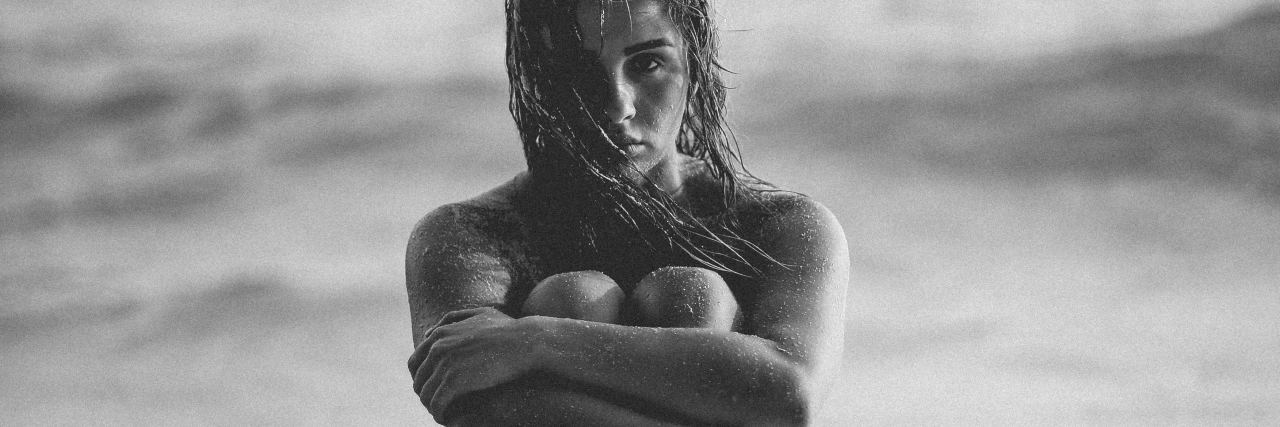How Christian Bi-Erasure Almost Caused My Suicide
Editor's Note
If you struggle with self-harm or experience suicidal thoughts, the following post could be potentially triggering. You can contact the Crisis Text Line by texting “START” to 741741. For a list of ways to cope with self-harm urges, visit this resource.
Names have been changed to protect privacy.
“What did you do to make Blake* gay?”
My mom flinched, unaware until now that Blake, whom she had nannied when he was a young, came out on social media the night before. Now, my mom’s friend was accusing her of tilting his sexual orientation in a “sinful” direction.
When my mom grew defensive, her friend covered with an “I’m kidding” before they launched into a conversation about had sad it all was. They both have affectionate memories of him as a child, of his innocence, of him reading his Bible of his own free will. Now, he was gay. Now, his faith was dead beyond resurrection. Now, they mourned.
I wonder if that friend will blame my mom for me.
I was 10 when I first noticed it — not the attraction to girls so much as the nauseating dread whenever I experienced it. Without putting those feelings into words, I sought affirmation that I wasn’t gay, that this was somehow normal. The first time I heard a straight woman call another woman beautiful, I felt some peace. Maybe I was OK. Maybe I wasn’t sinful.
Then I had my first sex dream at the age of 12 — about the girl sleeping over. I woke up next to her, too horrified to fall back to sleep. How could I? I was gay again. And being gay would be my identity, one that would override my identity in Christ — override my salvation. It was the one unforgivable sin. I would go to hell for feeling something I begged God I wouldn’t feel.
And, it didn’t make any sense. I had a boyfriend. I liked boys — I mean lots of boys. I met more boys I liked than didn’t like.
So, I buried that feeling under the ones I had for my boyfriend, then the next boyfriend, then the next, comforted by the fact the sinful way I occasionally looked at girls was the way I always looked at boys.
Then 13 hit, and whatever simmered beneath the surface boiled over. But not in sexual expression — in self-harm. I sat in the bath, summoning the courage to end my life. But I didn’t, too worried about what it’d do to my mom if she found her daughter dead.
After that, I wrestled with my sexuality less, burying my fears while I attended strict Christian schools. When I did talk about it, it was in whispers with a select few and always in the past tense:
I used to be attracted to girls.
Fast-forward through 13 years of obsessive-compulsive disorder (OCD) and suicidal depression. At 26, I was happily married with four books slated to be published. Writing was a childhood dream I never thought I’d be brave or skilled enough to accomplish.
But writing was also a shovel, indiscriminate and merciless, digging through layers of my being to what I had buried to survive. Writing found my boldness, my sensitivity, my empathy. It unearthed my prejudice, my doubts, my convictions.
And at the bedrock, it discovered my sexuality.
I’m attracted to women. I’m also attracted to men.
I’m aware it doesn’t matter now. Not really. I’m in love with my husband. I have no intention of cheating on him or leaving him. I know it’d be easier for everyone if I just kept my mouth shut.
But maybe Christians have had it too easy.
It’s too easy for my family to say they’ll make sure my son doesn’t “grow up gay.” It’s harder to recognize that ensuring I didn’t “grow up gay” almost killed me.
It’s too easy to talk about the LGTBQIA+ community as “others,” as “sinners,” as “the world.” It’s harder to call them “daughter,” “friend,” “Christian.”
It’s too easy to exclude an entire demographic from Christ’s love. It’s harder to admit we rely more on our heteronormativity than on our Savior to save us.
And that’s what we Christians do, isn’t it? We write a list of “sinful” things — things which we aren’t — to get on God’s good side. We don’t look at the sinful things we are because then we might see that we need the very grace we deny others.
I wonder how my life would be different now if I had known that grace as a child. Maybe I wouldn’t have spent the last 13 years fighting for my life. Maybe I would have. But maybe I can find that grace, that acceptance, now as an adult.
And I have, to an extent. Not everyone possesses the same capacity for grace, so not everyone deserves to hear my story. And not everyone deserves to hear yours.
Coming out is not a burden to those you’re vulnerable with. It’s a privilege. I’m not ready to give that privilege to everyone. It’s OK if you aren’t either. What’s not OK is the belief you don’t deserve to live because some people don’t deserve to know you fully.
One last thing: that Christian friend of my mom’s — the one I mentioned above — she has a son herself. Her son isn’t gay, but he’s no longer a Christian. She told us this with an “it is what it is” shrug.
He walked away from the faith she holds so dear. He refused the free gift of grace that transformed her life. She believes they’ll spend eternity apart.
But, hey, at least he doesn’t want to have sex with men.
Photo by Shifaaz Shamoon on Unsplash

